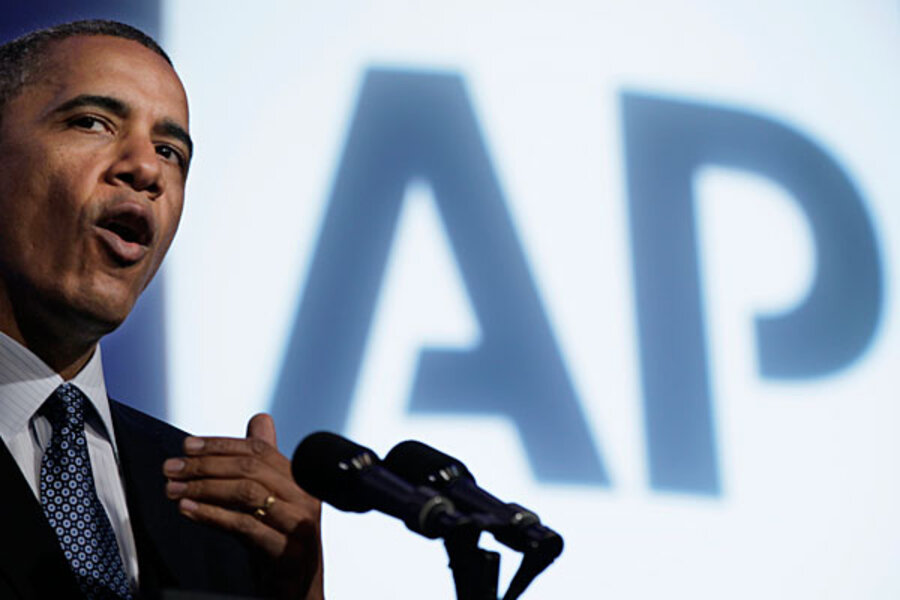Obama defends his health-care law. Could this become a campaign theme?
Loading...
President Obama, defending his health-care reform law for the second day in a row against the prospect it will be struck down by the Supreme Court, said Tuesday he had “enormous confidence” the law was constitutional.
“We’re not spending a whole lot of time planning for contingencies,” he told a gathering at the Associated Press Annual Meeting.
Although his tone was less combative than in comments made in the White House Rose Garden on Monday, the president nonetheless told the assembled news executives that it would be an extraordinary exertion of judicial power for the high court to invalidate the measure.
“We have not seen a court overturn a law that was passed by Congress on an economic issue, like health care, that I think most people would clearly consider commerce,” Obama said. “A law like that has not been overturned at least since [the pre-New Deal 1930s],” the president said.
On Monday, Obama issued what appeared to be a warning to the high court that if it overturned the Patient Protection and Affordable Care Act it would be engaging in the same kind of judicial activism that is frequently denounced by conservative commentators.
The president’s remarks sparked criticism that it is, in fact, the court’s job to enforce constitutional boundaries and ensure that the executive, legislative, and judicial branches do not exceed their assigned powers or usurp powers reserved to others.
“The point I was trying to make is that the Supreme Court is the final say on our Constitution and our laws, and all of us have to respect it,” he said. “But it is precisely because of that extraordinary power that the court has traditionally exercised significant restraint and deference to our duly-elected legislature, our Congress.”
He added: “So the burden is on those who would overturn a law like this.”
Obama appears to be refining a message that could become a central campaign theme should the high court strike down part or all of the law.
The legal challenge to the reform law centers on the measure’s so-called individual mandate – a government requirement that all Americans purchase an approved level of health insurance or pay a penalty.
At least five members of the Supreme Court expressed significant skepticism or concern about the prospect of ordering citizens to engage in a commercial transaction. Several justices said that if the government could order Americans to buy a product with the intent of regulating the purchase of that product there was nothing the federal government couldn’t regulate under its Commerce Clause powers.
Such a concept of federal power runs counter to the system of enumerated and limited national power established by the Founding Fathers, these justices said.
At the Supreme Court, the Obama administration argued that the justices should defer to the collective judgment of Congress to decide what could and could not be regulated under the Constitution’s Commerce Clause.
While it is true that the court has not invalidated such a major act of Congress since the 1930s, it is also true that Congress had never before advanced such an expansive concept of federal power.
Obama stressed that there was more to the constitutional showdown than just legal precedents and conflicting jurisprudential doctrines. “There is a human element to this that everyone has to remember,” he said. “It’s not an abstract exercise.”
“I get letters every day from people who are affected by the health-care law right now even though it’s not fully implemented,” he said. “Young people who are 24, 25, who say, ‘You know what, I just got diagnosed with a tumor. First of all, I would have not gone to get a checkup if I hadn’t had health insurance. Second of all, I wouldn’t have been able to afford to get it treated had I not been on my parents’ plan. Thank you and thank Congress for getting this done.’ ”
Most of the provisions of the Affordable Care Act don’t begin until 2014. But one measure now in force allows parents to keep their unmarried, adult children on their health-care plan until age 26.
The portion of the plan that is under attack is that part that requires young, healthy individuals to purchase insurance they might not otherwise buy. The Affordable Care Act bars insurance companies from refusing coverage based on a preexisting medical condition. It also bars insurance companies from charging higher rates to those with costly medical conditions.
The mandate is designed to help pay for those expensive reforms by forcing young, relatively healthy individuals to maintain a full line of medical insurance – even if they don’t want it or need it. Their forced participation is necessary to fund the reforms Congress and the president promised.
The president did not discuss this aspect of the Affordable Care Act. Instead, in his comments, he focused on a group of individuals who are uninsured but nonetheless obtain medical treatment at hospitals despite their lack of insurance and their lack of any ability to pay their own way. Such costs are passed by insurance companies to policy holders, increasing the average family premium by $1,000 a year, administration officials say.







